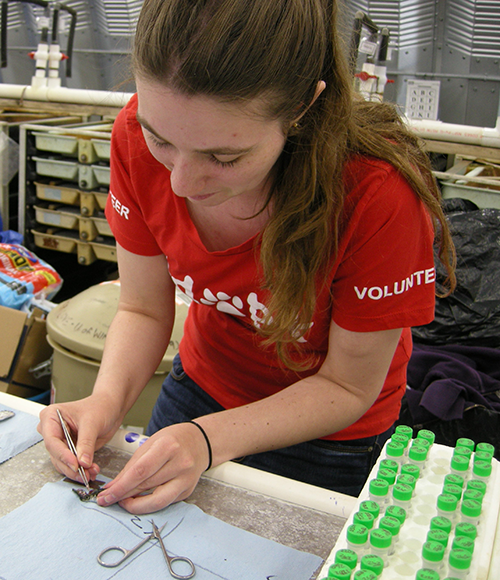Can probiotics change fish behavior?


Frank and her colleagues in Christina Semeniuk’s lab and comentor Daniel Heath’s lab at the University of Windsor in Ontario are trying to determine whether an unlikely intervention — a probiotic supplement in fish food — might help triploid Chinook salmon fare better. They’re starting with how the fish behave.
“Behavioral flexibility and sensitivity … would be an immediate measure for physiological (and neural genomic) change, given the connections between the gut–brain–behavior axis,” Semeniuk said.
Frank tested how probiotic supplements added to fish food affected the way hundreds of fingerling diploid and triploid fish respond to novel stimuli such as a glass bead tossed into the tank, a predator-shaped dummy passing overhead and an approaching human researcher. She will present her work as part of the Genomics poster session during the 2021 ASBMB annual meeting; you can see her talk and post questions while the meeting is underway.
In the future, Frank plans to integrate transcriptomic analyses with her behavioral studies, an approach known as behavioral genomics. Little is known about how triploidy affects genes related to learning and memory, so even if probiotics have little effect, she stands to learn something interesting.
Enjoy reading ASBMB Today?
Become a member to receive the print edition four times a year and the digital edition monthly.
Learn moreGet the latest from ASBMB Today
Enter your email address, and we’ll send you a weekly email with recent articles, interviews and more.
Latest in Science
Science highlights or most popular articles

Avoiding common figure errors in manuscript submissions
The three figure issues most often flagged during JBC’s data integrity review are background signal errors, image reuse and undeclared splicing errors. Learn how to avoid these and prevent mistakes that could impede publication.

Ragweed compound thwarts aggressive bladder and breast cancers
Scientists from the University of Michigan reveal the mechanism of action of ambrosin, a compound from ragweed, selectively attacks advanced bladder and breast cancer cells in cell-based models, highlighting its potential to treat advanced tumors.

Lipid-lowering therapies could help treat IBD
Genetic evidence shows that drugs that reduce cholesterol or triglyceride levels can either raise or lower inflammatory bowel disease risk by altering gut microbes and immune signaling.

Key regulator of cholesterol protects against Alzheimer’s disease
A new study identifies oxysterol-binding protein-related protein 6 as a central controller of brain cholesterol balance, with protective effects against Alzheimer’s-related neurodegeneration.

From humble beginnings to unlocking lysosomal secrets
Monther Abu–Remaileh will receive the ASBMB’s 2026 Walter A. Shaw Young Investigator Award in Lipid Research at the ASBMB Annual Meeting, March 7-10 in Washington, D.C.

Chemistry meets biology to thwart parasites
Margaret Phillips will receive the Alice and C. C. Wang Award in Molecular Parasitology at the ASBMB Annual Meeting, March 7-10 in Washington, D.C.

